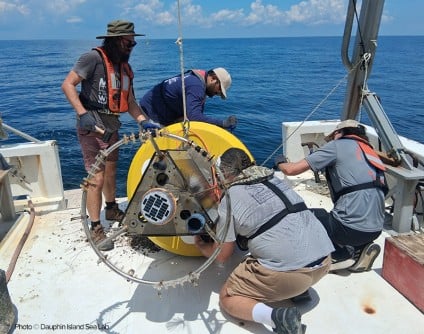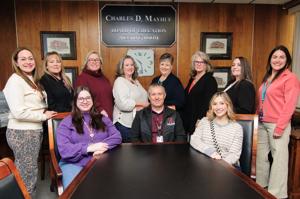Science
GCOOS Invites Project Proposals for 2026 IOOS Funding Cycle

The Gulf of America Coastal Ocean Observing System (GCOOS) has announced a call for project proposals as it prepares its next five-year funding proposal for the National Oceanic and Atmospheric Administration’s (NOAA) Integrated Ocean Observing System (IOOS). This initiative pertains to the funding period from July 2026 to June 2031, and GCOOS is actively seeking innovative project ideas from its members and stakeholders throughout the Gulf region.
Based at the Department of Oceanography at Texas A&M University, GCOOS is one of 11 regional observing networks under the IOOS umbrella in the United States. The organization focuses on connecting business leaders, marine scientists, resource managers, and various governmental and non-governmental organizations. By aggregating data from these diverse groups, GCOOS provides crucial information about ocean conditions, akin to the data collected by the National Weather Service for weather forecasts.
For over 20 years, GCOOS has delivered reliable and timely information regarding the Gulf’s coastal and open-ocean waters. This information supports ecosystems, local economies, and the communities that depend on healthy ocean environments. As part of its commitment to enhancing data accessibility, GCOOS is soliciting project proposals that can contribute to its upcoming proposal submission.
Proposal Details and Submission Timeline
The project ideas submitted can originate from various sectors, including public, private, academic, and nonprofit organizations. Although NOAA has yet to release the official funding opportunity, GCOOS is proactively preparing its proposal. Selected projects will align with the organization’s Strategic Plan 2020-2025 and the Addendum to the Build-out Plan, aimed at developing a robust ocean observing network across the Gulf of America.
Each Letter of Intent (LOI) submitted will undergo a formal review process to assess its suitability for integration into the comprehensive proposal. Project teams chosen for inclusion will receive notifications in a timely manner, allowing them to prepare the necessary documentation. This includes the approved budget, the SF424A budget form, budget justifications, and letters of support, which must be submitted through their institutional offices following NOAA’s announcement of the official request for applications.
The submission process has specific requirements, and incomplete or non-compliant submissions will be disqualified. The timeline for the LOI process is as follows:
– LOI Submission Deadline: 5 p.m. CT October 17, 2025
– Informational Webinar and Q&A: Mid-September (exact date TBD)
– LOI Review Period: October 20-31, 2025
– Notification of Inclusion in Full Proposal: November 1, 2025
– Deadline for Completion of Subaward Package: November 30, 2025
– Anticipated GCOOS Proposal Submission to NOAA: December 31, 2025
– Anticipated Project Start Date: July 1, 2026
Focus Areas for Project Proposals
GCOOS is particularly interested in projects that align with its Strategic Plan and focus on observing platforms, sensors, modeling, and education and outreach efforts. For detailed information regarding submission requirements and project specifications, interested parties are encouraged to visit GCOOS’s official website.
This initiative reinforces GCOOS’s commitment to fostering collaboration and innovation in ocean observation, ensuring that vital data continues to inform stakeholders and enhance understanding of Gulf waters.
-

 Science1 month ago
Science1 month agoNostradamus’ 2026 Predictions: Star Death and Dark Events Loom
-

 Technology2 months ago
Technology2 months agoOpenAI to Implement Age Verification for ChatGPT by December 2025
-

 Technology7 months ago
Technology7 months agoDiscover the Top 10 Calorie Counting Apps of 2025
-

 Health5 months ago
Health5 months agoBella Hadid Shares Health Update After Treatment for Lyme Disease
-

 Health5 months ago
Health5 months agoAnalysts Project Stronger Growth for Apple’s iPhone 17 Lineup
-

 Technology5 months ago
Technology5 months agoElectric Moto Influencer Surronster Arrested in Tijuana
-

 Science2 months ago
Science2 months agoBreakthroughs and Challenges Await Science in 2026
-

 Education5 months ago
Education5 months agoHarvard Secures Court Victory Over Federal Funding Cuts
-

 Health5 months ago
Health5 months agoErin Bates Shares Recovery Update Following Sepsis Complications
-

 Science4 months ago
Science4 months agoStarship V3 Set for 2026 Launch After Successful Final Test of Version 2
-

 Technology7 months ago
Technology7 months agoMeta Initiates $60B AI Data Center Expansion, Starting in Ohio
-

 Technology6 months ago
Technology6 months agoDiscover How to Reverse Image Search Using ChatGPT Effortlessly




















